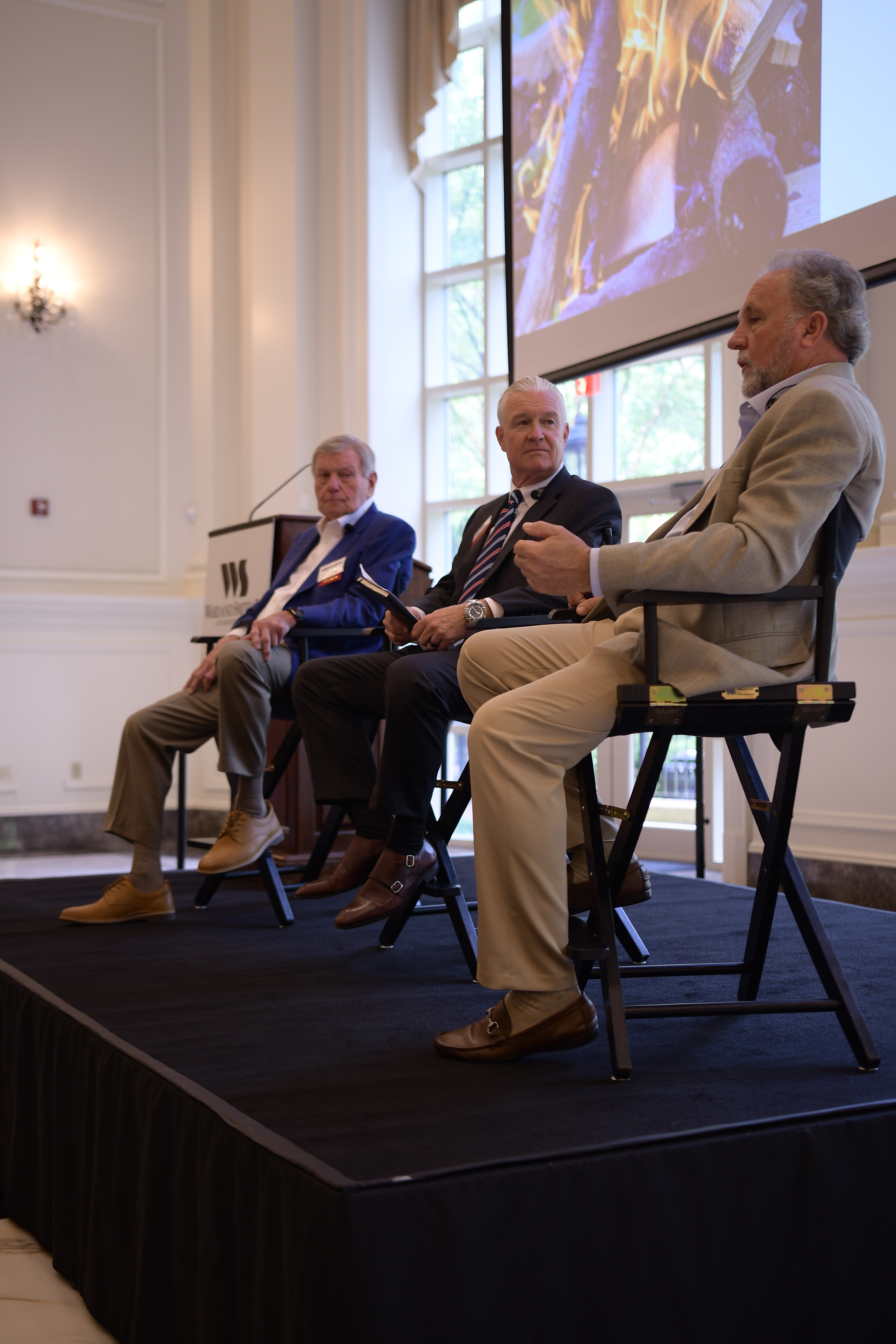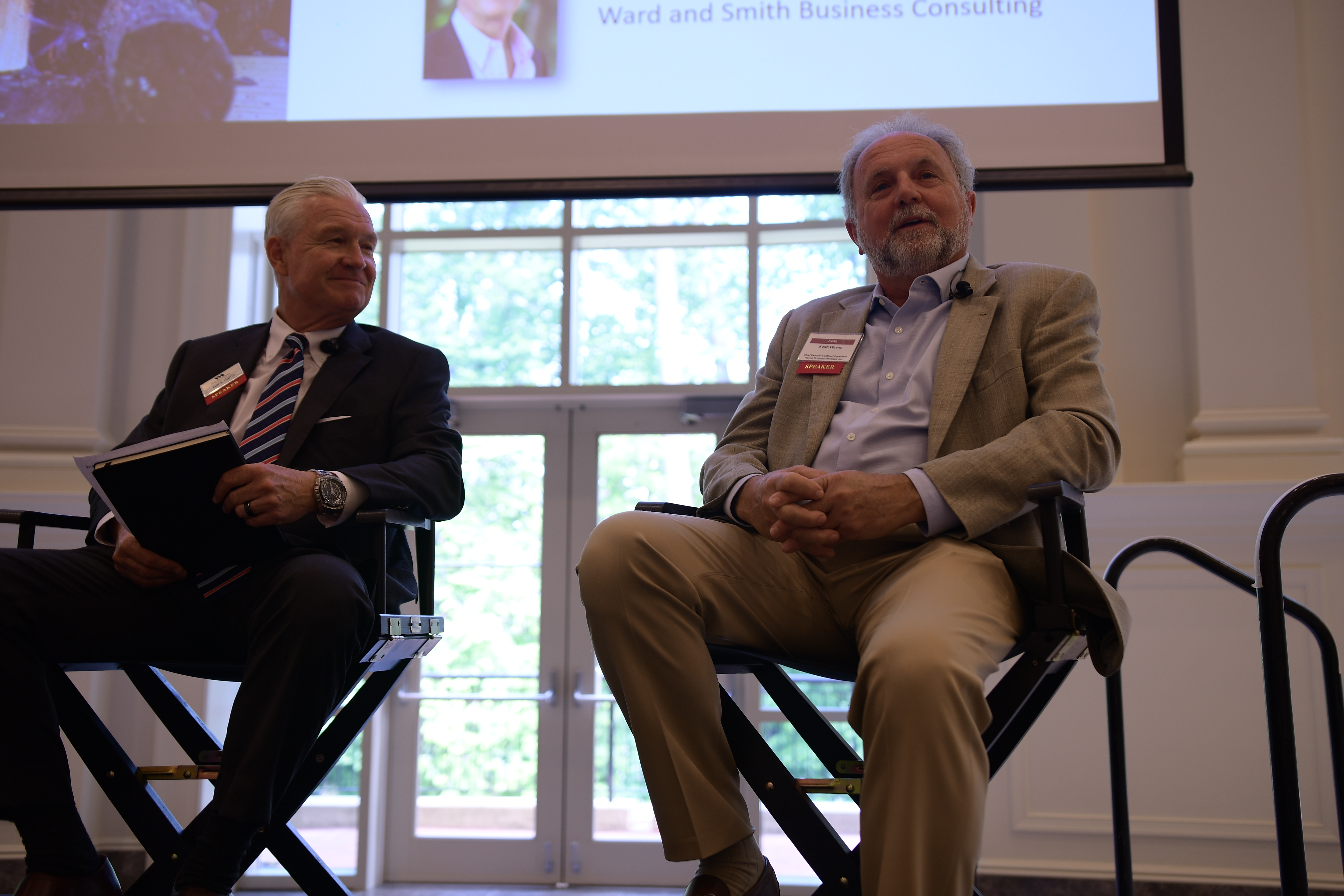In a forthright discussion moderated by Hank Harris, Director of Consulting for Ward and Smith's Business Consulting team, two of the North Carolina construction industry's most respected leaders shared candid insights and strategies that have facilitated their success for decades.
 Harris spent most of his career as a leader of FMI, a national construction management consulting and investment banking firm, where he specialized in working with privately held businesses. Having worked with hundreds of successful business owners over the years, Harris offers an insider's perspective on the issues that are important to entrepreneurs and privately held businesses.
Harris spent most of his career as a leader of FMI, a national construction management consulting and investment banking firm, where he specialized in working with privately held businesses. Having worked with hundreds of successful business owners over the years, Harris offers an insider's perspective on the issues that are important to entrepreneurs and privately held businesses.
The discussion featured real-world advice from industry leaders, Bob Barnhill and Keith Wayne, who shared their ideas on effective recruitment and retention strategies, current industry challenges, the importance of succession planning, projections for the future of construction, and more.
 Bob Barnhill is Chairman of the Board of Barnhill Contracting Company, a full-service construction company that was founded in 1949. Among many other achievements, Barnhill was recently honored with the Hall of Fame award from the Carolinas Associated General Contractors (CAGC), which reflects a lifetime of commitment to excellence and service to the industry.
Bob Barnhill is Chairman of the Board of Barnhill Contracting Company, a full-service construction company that was founded in 1949. Among many other achievements, Barnhill was recently honored with the Hall of Fame award from the Carolinas Associated General Contractors (CAGC), which reflects a lifetime of commitment to excellence and service to the industry.
From his early days in the field to his leadership as the president and CEO, and now in his role as the chairman, Barnhill helped the company become one of the Southeast's leading contractors, making a positive impact on the construction industry in North Carolina for decades.
 Keith Wayne, President and CEO of Wayne Brothers Companies, is also a member of the CAGC Hall of Fame. Wayne, who co-founded Wayne Brothers in 1985, started in construction at a young age and helped grow the company into a full-service provider with expertise in design/build, geostructural solutions, civil and infrastructure, sitework, concrete, and industrial services.
Keith Wayne, President and CEO of Wayne Brothers Companies, is also a member of the CAGC Hall of Fame. Wayne, who co-founded Wayne Brothers in 1985, started in construction at a young age and helped grow the company into a full-service provider with expertise in design/build, geostructural solutions, civil and infrastructure, sitework, concrete, and industrial services.
Wayne grew the company to include more than 700 employees across four offices in the Southeast, earning recognition as a USA Today Top Workplace for two consecutive years. Aside from his success in business, he is widely respected for his focus on advocating for education, training, and the trades.
Recruitment and Retention Strategies for Long-Term Construction Business Success
In business circles, it is not uncommon to hear about the importance of employee retention efforts in positioning a business for long-term success. Barnhill and Wayne agreed with the idea, explaining that the knowledge, skills, and abilities of their respective workforces have been essential to the evolution of their businesses.
"From the beginning, I knew I had to surround myself with good people, who could take parts of the operation and run with it," noted Barnhill. "A part of my role has been to create an environment where they can be successful."
Similarly, the importance of developing and empowering people is prominently displayed on the Wayne Brothers website as a part of the core ideology.
 Of course, employee retention strategies begin with finding the right people. "The war for talent has affected every aspect of business," noted Harris. "So, how do you find the right people? And how do you keep them there?"
Of course, employee retention strategies begin with finding the right people. "The war for talent has affected every aspect of business," noted Harris. "So, how do you find the right people? And how do you keep them there?"
"Talent is a huge success factor in any business, but particularly in construction. As a trade contractor, we require a vast variety of skill sets. Searching for people with those skill sets, or finding people that can be trained to acquire those skill sets, is a bit of a trade secret," commented Wayne.
Treating people fairly and positioning them for success can transform the workforce into a group of ambassadors for the company. "This is something we've always aspired to do on an internal basis," mentioned Wayne. "We've learned this can make our team function as recruiters and attract new employees."
How Company Culture Drives Retention in the Construction Industry
Another critical aspect of a recruitment/retention strategy is company culture. "I know culture is an overused term, but it is a real thing and definitely worth attention," said Wayne.
Culture is essential for attracting and retaining people over time. "People want to work for people they respect and admire. They want to know that the leadership is going to react to any problems that occur in the best way possible," added Wayne.
"People get tired of hearing about it, but if you have good employees, you will be successful," laughed Barnhill. "Part of it is ensuring they have the tools they need to excel. We've had people with us for 30 to 40 years. They've had a good life, especially a financial life, and aside from it being very fulfilling to be a part of making that happen for them, it's also worth noting that their example has been positively impactful for our recruitment—other people hear about it and want to be a part of the team."
Business Succession Planning in Family-Owned Construction Companies
Identifying new roles for employees to grow into is a critical component of a retention strategy. "How do you think about succession planning, not only as a big business, but also as a family business? I know a lot of construction businesses are family businesses," said Harris.
"Some of my guys have been with me for 25 to 30 years, and some for over 40," Barnhill said. "As a leader, I realized I had a responsibility to help them grow and chart a path that was specific to their individual skills. With that in mind, I started working with the team to develop a highly structured program. Succession planning is now a part of my everyday routine."
Managing a family business can be complex, and creating a strategy for passing the torch is not a task that can be accomplished overnight. "My brother is no longer a part of the business, even though his name is on it. I bought him out in 2004, but we're still brothers," joked Wayne, "and that's the most important thing, at the end of the day."
 Figuring out where the business stops and the family starts can be a challenge. "It is easy to confuse the love you have for your family with the love you have for the business you created," added Wayne.
Figuring out where the business stops and the family starts can be a challenge. "It is easy to confuse the love you have for your family with the love you have for the business you created," added Wayne.
Bringing in the next generation can also present a variety of challenges. "Any of us with children would likely want to have them involved, but it's imperative to understand that not all of them are well suited to be business owners, because it's very stressful, and some will simply want to pursue a different path," noted Wayne.
It is a necessity to seek assistance and start early, said Wayne: "What we've found is that it's just not feasible to transfer assets to the next generation in less than a few years. Get some help creating a plan and start executing that plan well in advance. Ward and Smith has been very helpful to us with our succession planning, and we've been working with them for years."
Timeless Leadership Advice from Construction Executives
Harris asked each panelist what one piece of excellent advice they've heard and found to be true. Barnhill replied with, "Contractors in search of new projects should consider that jobs are like buses, and if you don't get one, another one will always come along," he said. "This takes the pressure off a little in terms of the idea that you need to constantly look for new work."
Wayne noted it is critical to review the past, learn from mistakes, and move forward. He also said that anything is possible through hard work.
Future Trends in Construction: Design-Build, Collaboration, Prefabrication, and More
There is no such thing as a crystal ball; however, as Otto Frank said, "To build a future, you have to know the past." Experience brings insight, and this is at least partially why Harris asked Wayne and Barnhill about their ideas concerning what the future has in store for the construction industry.
On Design-Build: Over the past 15 years, Wayne and his team have constructed large numbers of big data center projects, and he expects the trend to continue. To provide design/build services, Wayne is using its wholly owned Southern Engineering Inc., and subcontracting with engineers from a variety of disciplines to deliver a better product in a more efficient timeframe.
On Single-Contract Projects: Delivering large-scale projects under one integrated contract is another change that Wayne believes will continue to impact the industry. "In a scenario like this, there could be 10-20 individual trade contractors, a General Contractor, and design firms all working toward one profit under one contract," Wayne commented.
On Collaboration: Wayne and Barnhill believe this trend, emphasizing collaboration, will positively impact the industry, particularly from a risk mitigation standpoint. Conversely, a trend Wayne finds concerning is the downward cycle of profit margins, as contractors opt for economies of scale to gain a competitive edge.
"Margins are slim and this leaves very little room for error," he said, "so it's possible we will see some folks going out of business."
On Prefabrication: The panel members predict that prefabrication will see increased adoption in the future. Whether using design software to build in 3D or developing major projects in the shop for assembly in the field, experts believe prefabrication will deliver an array of benefits to the construction industry.
This will also stabilize the workforce," noted Wayne. "A challenge with major projects is getting the right people to the job site. Building in the shop allows them to stay home."
On Leadership Skills: In response to an audience member wondering about the necessary leadership skills for success in the construction industry, Wayne advised developing a thorough knowledge of the trades: "Even if you have a business degree and an understanding of all the legal aspects, there's no replacement for that. Nobody straight out of school gets a desk; everyone has to swing a hammer if necessary, travel to the site, and be ready to work, because that's where the real learning happens."
 Learning how to get along with people and having empathy for your fellow employees is essential. "It's nice to know how to pour concrete the right way, but it's nicer to know how to get someone else to do it," laughed Barnhill.
Learning how to get along with people and having empathy for your fellow employees is essential. "It's nice to know how to pour concrete the right way, but it's nicer to know how to get someone else to do it," laughed Barnhill.
On Hiring and Retention: In terms of hiring practices, Barnhill's advice is to use personality tests for potential management employees. With terminations, it's better to make a decision instead of procrastinating: "One of the biggest weaknesses that affects any business is keeping a person that needs to go, because you're hurting the business by keeping someone out of that position that could be successful."
Wayne offered a unique insight for assessing candidates. "Find a corner office with a view of the parking lot," he said, "because you can tell so much by how an applicant walks to the door. This observation will help you trust your intuition as to whether they are looking for a career or just a paycheck."








